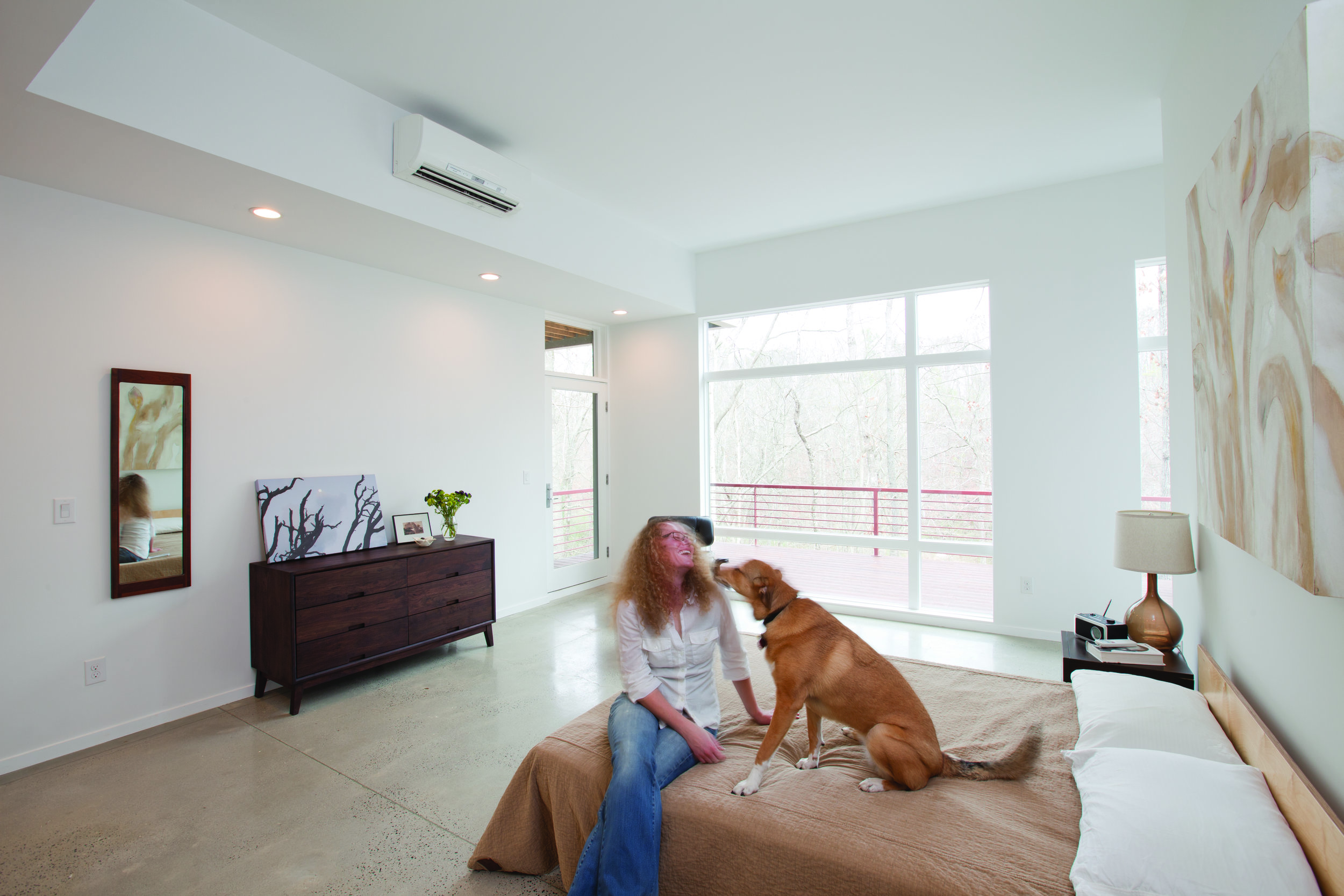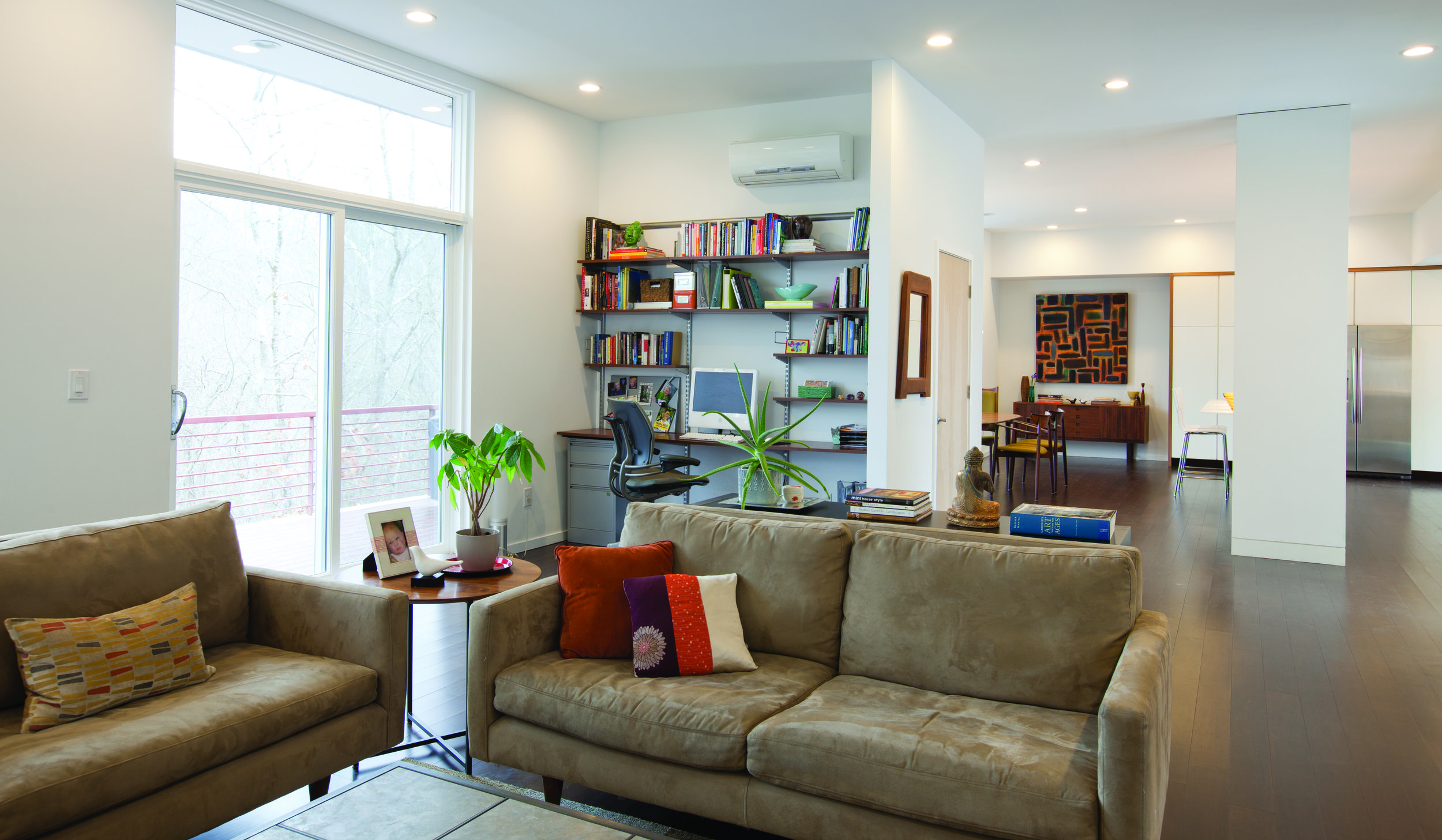Heat Pumps Perform: Q&A with Efficiency Maine
Photo courtesy of Mitsubishi Electric Trane
Maine home and business owners have installed over 45,000 heat pumps in the last 5 years, according to rebate numbers from Efficiency Maine. They have proven to be an effective heat source in our cold climate, offering an affordable option to reduce both heating costs and carbon emissions. So much so, in fact, that Governor Mills recently set a goal of 100,000 additional heat pumps installed in Maine homes and businesses over the next five years.
We sat down with Ian Burnes and Andy Meyer from Efficiency Maine to see what they have learned from Maine’s experience with heat pumps and to get some tips on maximizing their effectiveness.
GHM: Why are we seeing such an increase in heat pump usage in Maine? What opportunity do heat pumps offer to Maine home and business owners?
ANDY: A major reason for the popularity of heat pumps is that the new generation of high-efficiency models work well in all four seasons and can help customers lower their heating bills. Adding 100,000 more units in Maine homes and businesses has the potential to reduce heating bills in the range of $30 - $ 60 million per year. For individual pocket books and the local economy, that is pretty exciting. People also seem interested in moving to clean energy technology, and the modern, high-efficiency heat pumps clearly meet that definition.
GHM: There are some misconceptions out there that heat pumps don’t work well in the cold weather. Can you help to clear this up?
ANDY: That misconception stems from experiences with traditional heat pumps, not the new generation of high- efficiency units that we rebate. Much of the country uses heat pumps that don’t meet Efficiency Maine’s high efficiency standards – standards that ensure heat pumps will deliver heat in the cold. So, while it is true that some heat pump models – such as lower efficiency models or older models – don’t perform as well at very cold temperatures, this is not the case for the high-efficiency models that we recommend for Maine homes and businesses.
GHM: If heat pumps have to work harder to produce heat in the cold, does that mean they are less efficient and more expensive to run than an average oil boiler?
IAN: The outside temperature has to fall below 0°F before the high-efficiency heat pumps we recommend become more expensive to operate than a fossil- fired furnace or boiler (see graph 1). And it’s only for those limited hours that the temperature is below 0°F. In Portland, over 99% of heating hours in the typical year are above 0°F, where heat pumps are cheaper to run (see graph on page 57). Even in Bangor, over 97% of the heating hours are above 0°F. Because there are so few hours of the winter when heat pumps are more expensive to operate, we recommend setting the heat pump at a comfortable temperature and leaving it there for the entire heating season.
ANDY: If you decided to switch back and forth between your heat pump and boiler every time the temperature drops below and rose above 0°F, you might be able to save a couple of dollars each year, depending on your fuel type and price. But, if you forgot to switch back to your heat pump for even a short period, you’d quickly erase those savings.
IAN: And if you heat with propane, there is no temperature at which your boiler would provide less expensive heat than a heat pump, because propane is more expensive per unit of energy.
ANDY: Heat pumps are one of the most cost-effective ways to reduce your heating expenses. And this is true even if you only offset a portion of your heating needs with a heat pump.
GHM: So how should we be running our heat pumps to save the most money and energy?
Photo courtesy of Mitsubishi Electric Trane
ANDY: The first thing you can do is to prioritize your heat pump. In other words, set the thermostat on your boiler or furnace several degrees lower than the thermostat for your heat pump. This way, your boiler or furnace will only turn on when your heat pump can’t keep up.
IAN: Regarding the temperature setting on your heat pump, we also recommend users set it and forget it. Unlike other heating systems, turning your heat pump down at night, or when you leave the house, may not save you energy. Heat pumps are designed to maintain a steady temperature, and they’re most efficient when allowed to do so.
GHM: A lot of our readers are concerned about carbon emissions as well as savings. How much carbon can you offset by using a heat pump?
ANDY: Heat pumps use electricity to heat your home, so their carbon footprint depends on how clean the power generation is that serves the regional
energy grid. The mix of generation that serves the grid in Maine is among the cleanest in the country.
IAN: We’ve crunched the numbers, and if you have a ductless heat pump that offsets just one third of your home’s annual heating load, it would eliminate 2,400 pounds of CO2 per year, the equivalent of eliminating three months of driving your car. Obviously, the more your heat pump offsets your home’s heating load, the greater the savings.
To learn more about high- efficiency heat pumps, including recommended installers, models that work in Maine’s cold climates and available rebates, visit the Efficiency Maine website at www.efficiencymaine.com/ about-heat-pumps.
This article appeared in the Spring 2019 issue of Green & Healthy Maine HOMES magazine. (updated 9/20)
Subscribe today!




